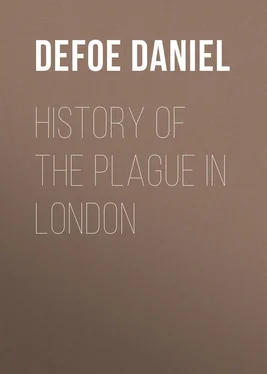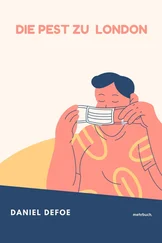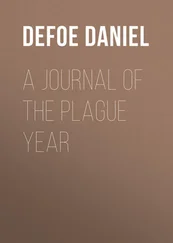Daniel Defoe - History of the Plague in London
Здесь есть возможность читать онлайн «Daniel Defoe - History of the Plague in London» — ознакомительный отрывок электронной книги совершенно бесплатно, а после прочтения отрывка купить полную версию. В некоторых случаях можно слушать аудио, скачать через торрент в формате fb2 и присутствует краткое содержание. Жанр: foreign_antique, foreign_prose, на английском языке. Описание произведения, (предисловие) а так же отзывы посетителей доступны на портале библиотеки ЛибКат.
- Название:History of the Plague in London
- Автор:
- Жанр:
- Год:неизвестен
- ISBN:нет данных
- Рейтинг книги:4 / 5. Голосов: 1
-
Избранное:Добавить в избранное
- Отзывы:
-
Ваша оценка:
- 80
- 1
- 2
- 3
- 4
- 5
History of the Plague in London: краткое содержание, описание и аннотация
Предлагаем к чтению аннотацию, описание, краткое содержание или предисловие (зависит от того, что написал сам автор книги «History of the Plague in London»). Если вы не нашли необходимую информацию о книге — напишите в комментариях, мы постараемся отыскать её.
History of the Plague in London — читать онлайн ознакомительный отрывок
Ниже представлен текст книги, разбитый по страницам. Система сохранения места последней прочитанной страницы, позволяет с удобством читать онлайн бесплатно книгу «History of the Plague in London», без необходимости каждый раз заново искать на чём Вы остановились. Поставьте закладку, и сможете в любой момент перейти на страницу, на которой закончили чтение.
Интервал:
Закладка:
The watchman had knocked at the door, it seems, when he heard that noise and crying, as above, and nobody answered a great while; but at last one looked out and said with an angry, quick tone, and yet a kind of crying voice, or a voice of one that was crying, "What d'ye want, that you make such a knocking?" He answered, "I am the watchman. How do you do? What is the matter?" The person answered, "What is that to you? Stop the dead cart." This, it seems, was about one o'clock. Soon after, as the fellow said, he stopped the dead cart, and then knocked again, but nobody answered; he continued knocking, and the bellman called out several times, "Bring out your dead;" but nobody answered, till the man that drove the cart, being called to other houses, would stay no longer, and drove away.
The watchman knew not what to make of all this, so he let them alone till the morning man, or "day watchman," as they called him, came to relieve him. Giving him an account of the particulars, they knocked at the door a great while, but nobody answered; and they observed that the window or casement at which the person looked out who had answered before, continued open, being up two pair of stairs.
Upon this, the two men, to satisfy their curiosity, got a long ladder, and one of them went up to the window and looked into the room, where he saw a woman lying dead upon the floor, in a dismal manner, having no clothes on her but her shift. 92 92 Chemise.
But though he called aloud, and, putting in his long staff, knocked hard on the floor, yet nobody stirred or answered, neither could he hear any noise in the house.
He came down again upon this, and acquainted his fellow, who went up also; and finding it just so, they resolved to acquaint either the lord mayor or some other magistrate of it, but did not offer to go in at the window. The magistrate, it seems, upon the information of the two men, ordered the house to be broke open, a constable and other persons being appointed to be present, that nothing might be plundered; and accordingly it was so done, when nobody was found in the house but that young woman, who having been infected, and past recovery, the rest had left her to die by herself, and every one gone, having found some way to delude the watchman, and to get open the door, or get out at some back door, or over the tops of the houses, so that he knew nothing of it. And as to those cries and shrieks which he heard, it was supposed they were the passionate cries of the family at this bitter parting, which, to be sure, it was to them all, this being the sister to the mistress of the family; the man of the house, his wife, several children and servants, being all gone and fled: whether sick or sound, that I could never learn, nor, indeed, did I make much inquiry after it.
At another house, as I was informed, in the street next within Aldgate, a whole family was shut up and locked in because the maidservant was taken sick. The master of the house had complained by his friends to the next alderman, and to the lord mayor, and had consented to have the maid carried to the pesthouse, but was refused: so the door was marked with a red cross, a padlock on the outside, as above, and a watchman set to keep the door, according to public order.
After the master of the house found there was no remedy, but that he, his wife, and his children, were locked up with this poor distempered servant, he called to the watchman, and told him he must go then and fetch a nurse for them to attend this poor girl, for that it would be certain death to them all to oblige them to nurse her, and told him plainly that if he would not do this the maid would perish either 93 93 This word is misplaced; it should go before "perish."
of the distemper, or be starved for want of food, for he was resolved none of his family should go near her; and she lay in the garret, four story high, where she could not cry out or call to anybody for help.
The watchman consented to that, and went and fetched a nurse as he was appointed, and brought her to them the same evening. During this interval, the master of the house took his opportunity to break a large hole through his shop into a bulk or stall, where formerly a cobbler had sat before or under his shop window; but the tenant, as may be supposed, at such a dismal time as that, was dead or removed, and so he had the key in his own keeping. Having 94 94 Before "having," supply "the master."
made his way into this stall, which he could not have done if the man had been at the door, the noise he was obliged to make being such as would have alarmed the watchman, – I say, having made his way into this stall, he sat still till the watchman returned with the nurse, and all the next day also; but the night following, having contrived to send the watchman of another trifling errand (which, as I take it, was to an apothecary's for a plaster for the maid, which he was to stay for the making up, or some other such errand that might secure his staying some time), in that time he conveyed himself and all his family out of the house, and left the nurse and the watchman to bury the poor wench, that is, throw her into the cart, and take care of the house.
Not far from the same place they blowed up a watchman with gunpowder, and burned the poor fellow dreadfully; and while he made hideous cries, and nobody would venture to come near to help him, the whole family that were able to stir got out at the windows (one story high), two that were left sick calling out for help. Care was taken to give them nurses to look after them; but the persons fled were never found till, after the plague was abated, they returned. But as nothing could be proved, so nothing could be done to them.
In other cases, some had gardens and walls, or pales, 95 95 Fences.
between them and their neighbors, or yards and backhouses; and these, by friendship and entreaties, would get leave to get over those walls or pales, and so go out at their neighbors' doors, or, by giving money to their servants, get them to let them through in the night. So that, in short, the shutting up of houses was in no wise to be depended upon; neither did it answer the end at all, serving more to make the people desperate, and drive them to such extremities as that they would break out at all adventures.
And that which was still worse, those that did thus break out spread the infection farther, by their wandering about with the distemper upon them in their desperate circumstances, than they would otherwise have done; for whoever considers all the particulars in such cases must acknowledge, and cannot doubt, but the severity of those confinements made many people desperate, and made them run out of their houses at all hazards, and with the plague visibly upon them, not knowing either whither to go, or what to do, or indeed what they did. And many that did so were driven to dreadful exigencies and extremities, and perished in the streets or fields for mere want, or dropped down by 96 96 From.
the raging violence of the fever upon them. Others wandered into the country, and went forward any way, as their desperation guided them, not knowing whither they went or would go, till, faint and tired, and not getting any relief, the houses and villages on the road refusing to admit them to lodge, whether infected or no, they have perished by the roadside, or gotten into barns, and died there, none daring to come to them or relieve them, though perhaps not infected, for nobody would believe them.
On the other hand, when the plague at first seized a family, that is to say, when any one body of the family had gone out, and unwarily or otherwise catched 97 97 This old form for "caught" is used frequently by Defoe.
the distemper and brought it home, it was certainly known by the family before it was known to the officers, who, as you will see by the order, were appointed to examine into the circumstances of all sick persons, when they heard of their being sick.
Интервал:
Закладка:
Похожие книги на «History of the Plague in London»
Представляем Вашему вниманию похожие книги на «History of the Plague in London» списком для выбора. Мы отобрали схожую по названию и смыслу литературу в надежде предоставить читателям больше вариантов отыскать новые, интересные, ещё непрочитанные произведения.
Обсуждение, отзывы о книге «History of the Plague in London» и просто собственные мнения читателей. Оставьте ваши комментарии, напишите, что Вы думаете о произведении, его смысле или главных героях. Укажите что конкретно понравилось, а что нет, и почему Вы так считаете.












